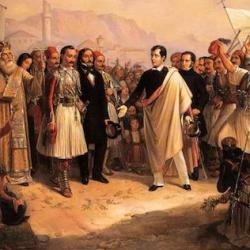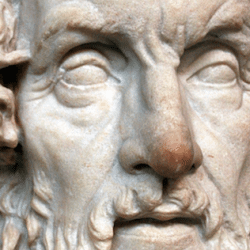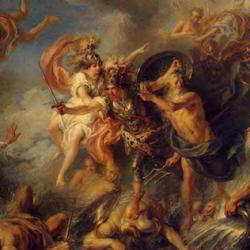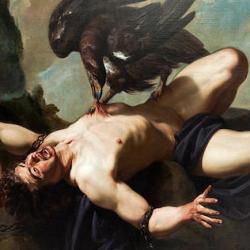Some selections from Diogenes Laertius’ “Life of Heraclitus, from his “Lives and Opinions of Eminent Philosophers:
“He was above all men of a lofty and arrogant spirit, as is plain from his writings, in which he says, ‘Abundant learning does not form the mind; for if it did, it would have instructed Hesiod, and Pythagoras, and likewise Xenophanes, and Hecataeus. For the only piece of real wisdom is to know that idea, which by itself will govern everything on every occasion.’ He used to say, too, that Homer deserved to be expelled from the games and beaten, and Archilochus likewise. He used also to say, ‘It is more necessary to extinguish insolence, than to put out a fire.’ Another of his sayings was, ‘The people ought to fight for the law, as for their city’ . . .
“He also attacks the Ephesians for having banished his companion Hermodorus, when he says, ‘The Ephesians deserve to have all their youth put to death, and all those who are younger still banished from their city, inasmuch as they have banished Hermodorus, the best man among them, saying, “Let no one of us be pre-eminently good; and if there be any such person, let him go to another city and another people.’
“And when he was requested to make laws for them, he refused, because the city was already immersed in a thoroughly bad constitution. And having retired to the temple of Diana with his children he began to play at dice; and when all the Ephesians flocked round him, he said, ‘You wretches, what are you wondering at? is it not better to do this, than to meddle with public affairs in your company?’
“And at last becoming a complete misanthrope, he used to live, spending his time in walking about the mountains; feeding on grasses and plants, and in consequence of these habits, he was attacked by the dropsy, and so then he returned to the city, and asked the physicians, in a riddle, whether they were able to produce a drought after wet weather. And as they did not understand him, he shut himself up in a stable for oxen, and covered himself with cow-dung, hoping to cause the wet to evaporate from him, by the warmth that this produced. And as he did himself no go good in this way, he died, having lived seventy years . . . .
“But Hermippus states, that what he asked the physicians was this, whether any one could draw off the water by depressing his intestines? and when they answered that they could not, he placed himself in the sun, and ordered his servants to plaster him over with cow-dung; and being stretched out in that way, on the second day he died, and was buried in the market-place. But Neanthes, of Cyzicus says, that as he could not tear off the cow-dung, he remained there, and on account of the alteration in his appearance, he was not discovered, and so was devoured by the dogs.”
When King Darius of Persia contacted him inviting him to come and discourse before the Persian court, Heraclitus responded: “All the men that exist in the world, are far removed from truth and just dealings; but they are full of evil foolishness, which leads them to insatiable covetousness and vain-glorious ambition. I, however, forgetting all their worthlessness, and shunning satiety, and who wish to avoid all envy on the part of my countrymen, and all appearance of arrogance, will never come to Persia, since I am quite contented with a little, and live as best suits my own inclination.”














